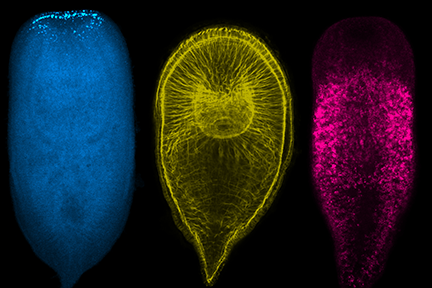Date:
Location:

Mansi Srivastava, John L. Loeb Associate Professor of the Natural Sciences, Curator of Invertebrate Zoology, Organismic and Evolutionary Biology Museum of Comparative Zoology, Harvard University
Regeneration is a remarkable phenomenon in which an animal can regrow parts of its body that are lost or damaged by injury. Humans, for example, can repair some organs, but some animals can rebuild their entire bodies from small pieces of tissue. How do these animals accomplish this feat? And why is it that humans cannot regenerate as well as these animals can? Studies of how regeneration works at the molecular and cellular level are beginning to answer the first question. To answer the second question, we have to understand how regeneration has evolved. Mansi Srivastava will highlight major insights about regeneration based on her team’s research on the three- banded panther worm, a marine invertebrate species that enables us to study how regeneration works and how the process has evolved.
Evolution Matters Lecture Series
Series supported by a generous gift from Drs. Herman and Joan Suit
Advance registration required. Please note that registration closes 30 minutes prior to the event start time.
To join the program, you will need to download the free Zoom app in advance. If you already have Zoom, you do not need to download it again. For details on how to improve your Zoom experience, visit the How to Attend an HMSC Program webpage.
About the Speaker
Mansi received her AB in Biological Sciences from Mount Holyoke College, where she became fascinated by the process of regeneration and wrote her honors thesis on regeneration in segmented worms. She studied animal evolution using comparative genomics for her PhD in Molecular and Cell Biology from the University of California at Berkeley. For her postdoctoral training at the Whitehead Institute/Massachusetts Institute of Technology, Mansi returned to her interest in regeneration and developed the three-banded panther worm as a new research organism for studying the evolution of regeneration. In 2015, Mansi joined the faculty of the Organismic and Evolutionary Biology Department at Harvard University and became a curator of Invertebrate Zoology at the Museum of Comparative Zoology. Mansi’s research group uses panther worms to develop new approaches studying both the mechanisms and evolution of regeneration.

